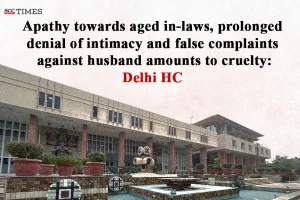Disclaimer: This has been reported after the availability of the order of the Court and not on media reports so as to give an accurate report to our readers.
Delhi High Court: In an appeal filed against an order dated 30-9-2021 (‘impugned order’), wherein the Family Court had granted a decree of divorce under Section 13(1)(ia) of the Hindu Marriage Act, 1955 (‘HMA’) on the grounds of cruelty against the husband and his family, the Division Bench of Anil Kshetarpal and Harish Vaidyanathan Shankar*, JJ, held that prolonged denial of marital intimacy, false allegations of harassment against husband and apathy towards aging in-laws amounts to cruelty under the HMA.
Thus, the Court dismissed the appeal and upheld the impugned order.
Background
The marriage between appellant-wife and respondent-husband had been solemnized in 1990 and a son had been born out of wedlock in 1997. The husband had contended that the wife’s conduct during the persistence of marriage was consistently cruel as she would frequently leave the matrimonial home without his consent and was unwilling to reside in a joint family. The husband had also submitted that from the year 2008, the wife had withdrawn from marital relations and subjected him to humiliation and indignity, often misbehaving, throwing footwear at him and once even slapping his mother. The husband had also averred that the wife had pressurized him and his family to transfer property in her favour and when he declines, she had threatened to implicate them in false criminal charges.
In 2009 the husband had instituted a petition under Section 13(1) (ia) of the HMA seeking dissolution of marriage on the grounds of cruelty. Subsequently in 2010, the wife had lodged several First Information Reports (‘FIRs’) against the husband and his family. The Family Court, vide the impugned order, had held that the actions of the wife amounted to cruelty under the HMA and had accordingly granted the decree of divorce.
Aggrieved by the same, the wife had instituted the instant appeal stating that the allegations of cruelty and denial of conjugal duties were unsubstantiated and that the FIRs lodged by her were genuine complaints of harassment rather than mere retaliatory measures.
Analysis, Law and Decision
The Court referred to the case of Vinita Saxena v. Pankan Pandit, (2006) 3 SCC 778, wherein the Supreme Court had observed that the absence of harmonious intimacy not only undermines the marriage but also inflicts emotional harm, often resulting in depression and frustration. The Court also referred to the case of Vindhya Vishwanathan v. Kartik Balakrishnan, (2014) 15 SCC 21, wherein the Supreme Court had held that the persistent denial of sexual relations by one spouse to the other without a justifiable cause constituted mental cruelty.
In light of the aforementioned judgements, the Court opined that the persistent deprivation of conjugal companionship constituted an extreme form of cruelty. Cohabitation and discharge of marital duties forms the bedrock of marriage and their persistent denial not only demonstrates an irretrievable breakdown of marriage but also amounts to cruelty warranting judicial intervention.
The Court further observed that while the mere absence of physical intimacy by itself may not be a sufficient ground for divorce, it must be evaluated in conjunction with other circumstances. The point of enquiry is not confined to a single incident of omission but rather what the cumulative impact on the marital relationship would be and whether the quality of marital life has been so eroded that the matrimonial bond is rendered unsustainable.
The Court also observed that the chronology of the criminal complaints and allegations made it evident that they had been initiated only after the divorce petition had been filed, implying that they were in essence a counterblast, aimed at exerting pressure in the matrimonial dispute rather than reflecting genuine, contemporaneous grievances.
The Court further noted that the wife’s indifference and apathy toward the husband’s aged parents, who are an integral part of the joint Hindu family, reflected her disregard for essential obligations of marriage. The Court opined that the lack of sensitivity displayed by the wife towards her in-laws, especially when her mother-in-law had undergone hip replacement surgery and was unable to walk, inflicted considerable anguish on the husband and his family, thereby adding to another facet of cruelty.
Thus, the Court held that the wife’s prolonged denial of marital intimacy, the series of complaints instituted against the husband, and the apathy towards the aged parents of the husband collectively demonstrate a sustained neglect of marital responsibilities. These actions caused the husband and his family considerable emotional suffering, thereby constituting cruelty of such gravity as to justify dissolution of the marriage under Section 13(1) (ia) of the HMA.
[X v. Y., 2025 SCC OnLine Del 6112, decided on 19-9-2025]
*Judgment Authored by: Justice Harish Vaidyanathan Shankar
Advocates who appeared in this case:
For the Appellant: Sanjay Rathi, Advocate
For the Respondent: Sudhir Tewatia, Sahil Gandhi, Aman Gahlot, Himani Verma, Kavya, Vivek, Advocates

